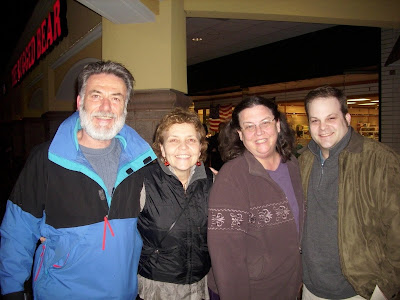 |
| Carl "Skip" Battaglia, Stephanie Maxwell, Marla Schweppe, Me. (l to r) |
So it's Fall and I'm back teaching again.
One of my colleagues said that I should consider working on a film during my spare time and then showing it to my students on the last day of class. Sort of a "hey, I did this over the past four months in my spare time, think about what you could accomplish." Well, as I was shuffling through the backlog of stalled ideas and "y'know, if I ever get the time" sketches, I came across this little gem from my former professor Carl "Skip" Battaglia. Back in 2008, I was toying with the idea of an abstract animation but it didn't fit into the mold of narrative animations that I was used to using when designing films. As Skip is an accomplished animator who is very knowledgeable about experimental techniques, I reached out to him:
|
Hi Skip, Hope this letter finds you well. It was a real treat to talk to you and your daughter at Ottawa and see what you've been working on for the past year. Sorry that you didn't win the award for experimental/abstract animated short film, but was very happy to see your film in the competition. Well, after watching your latest film (and reviewing your Skip's Pics DVD), I've bumped up an abstract/experimental-style animation on my list of projects. The entire short animation deals with the techniques and artistic style that I'm learning about in my Oriental Watercolor class this semester. However, as I'm working through the planning stages of this film, I'm finding that the traditional treatment-script-storyboard-soundtrack method that I use to plan films just isn't lending itself very well to abstract expression. I'm getting kind of frustrated trying to get a film to fit into a mold that it wasn't designed for. So, I was wondering if you could suggest a couple of books that you use to plan your films that I could read? Thanks Skip, and see you in Ottawa '08. Hopefully by then, I'll have a couple of films to run alongside you and Stephanie. And please give your daughter our best from me and Ted. Hope she does well in her final class. =) Sincerely, Charles Wilson |
This was his response:
|
Hi Charles: There are no hard-and-fast books in experimental design for animation. I read philosophy and poetry, study painting. I have always listened to a lot of musics, including experimental, free jazz, South American, and African. My notebooks and sketches provoke some things. Knowledge about film continuity (which you have), animation production, storyboarding (pay attention to the vectors of movement; I arrow them in/over in red pencil) are helpful as the storyboard will come directly in response to your premise for the film. Sometimes I begin with a rough idea, then score a musical track via ProTools to give me a scratch soundtrack to animate to for the sake of rhythm, tempo, drama -- and to have a timed track to give to a composer later. Thinking historically, the books which have been most helpful are/were: Rudolph Arhheim, "Art and Visual Perception." H. Marshall McLuhan and Herley Parker, "Through the Vanishing Point." "Zen Mind, Beginner's Mind." books on graphic design, painting process... ... and everything I teach, and films I've viewed. I'd also think about designing the film in reverse or out of sequence from your usual methods. It would enable a new approach (which seems to be what you're looking for). Good to see you. Let me know how this goes. Get loose! Skip |


